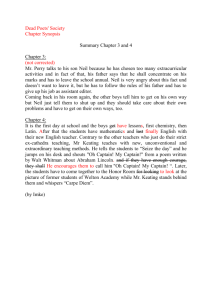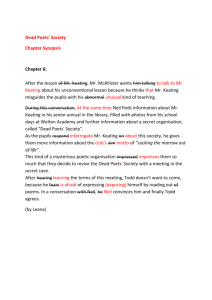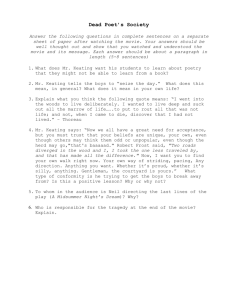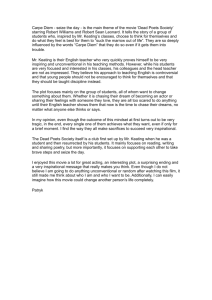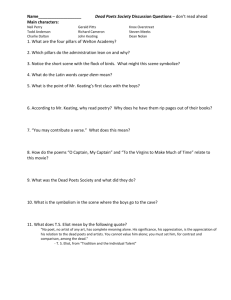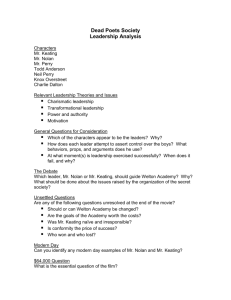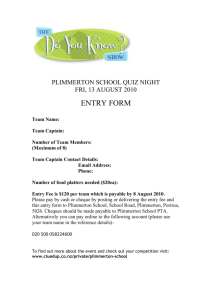Dead Poets Society - West Ada School District
advertisement
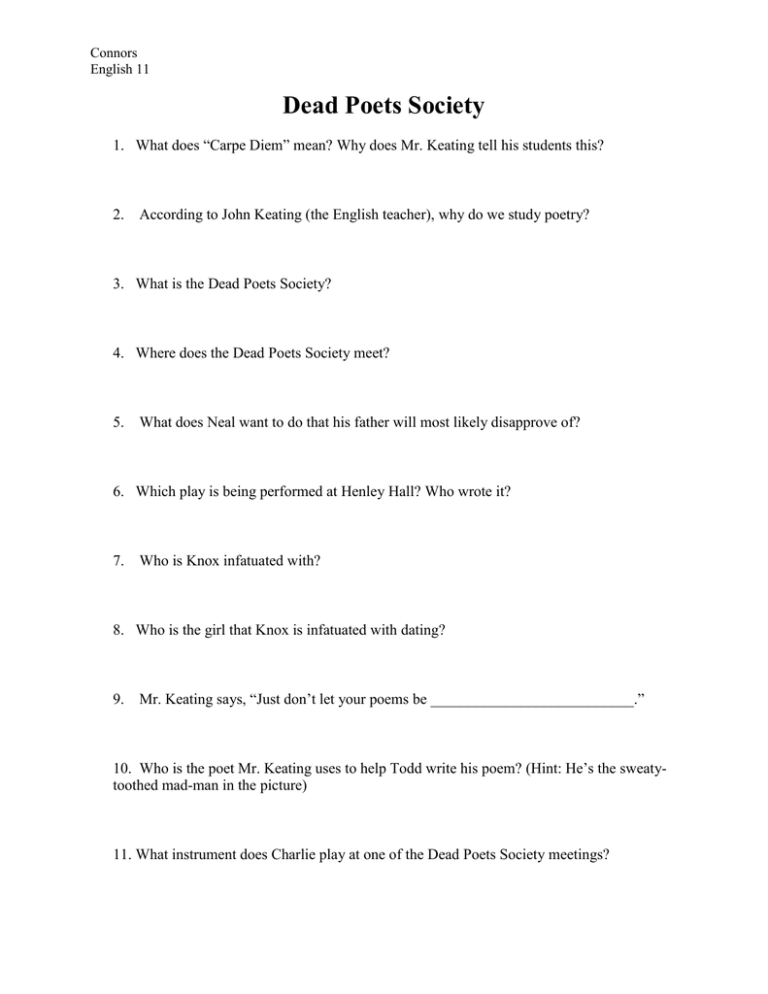
Connors English 11 Dead Poets Society 1. What does “Carpe Diem” mean? Why does Mr. Keating tell his students this? 2. According to John Keating (the English teacher), why do we study poetry? 3. What is the Dead Poets Society? 4. Where does the Dead Poets Society meet? 5. What does Neal want to do that his father will most likely disapprove of? 6. Which play is being performed at Henley Hall? Who wrote it? 7. Who is Knox infatuated with? 8. Who is the girl that Knox is infatuated with dating? 9. Mr. Keating says, “Just don’t let your poems be ___________________________.” 10. Who is the poet Mr. Keating uses to help Todd write his poem? (Hint: He’s the sweatytoothed mad-man in the picture) 11. What instrument does Charlie play at one of the Dead Poets Society meetings? Connors English 11 12. What poem does Mr. Keating use to make his point about everyone being different (when they were walking in the courtyard)? Who wrote the poem? 13. What do Todd’s parents give him for his birthday (again)? ________________________ What do both he and Neal do with it? 14. What is Charlie’s new name (instead of Charles Dalton)? 15. What type of punishment does Charlie, or Nuwanda, get for putting the letter to the editor in the newspaper (as well as his “It’s God calling” stunt)? 16. What does Mr. Keating think the purpose of education is? 17. “There is a time for daring, there is a time for ____________________,” said Mr. Keating. 18. Why does Neal go to Mr. Keating for help? 19. Do you think Mr. Keating is at fault for the tragedy? Why or why not? Explain... 20. How does Mr. Keating teach elements of Romanticism and Transcendentalism in the movie? Why would the Meridian School District use Dead Poets Society to teach this? Connors English 11 Poems Included in the Movie O Captain, My Captain By Walt Whitman O Captain! my Captain! our fearful trip is done; The ship has weather'd every rack, the prize we sought is won; The port is near, the bells I hear, the people all exulting, While follow eyes the steady keel, the vessel grim and daring: But O heart! heart! heart! O the bleeding drops of red, Where on the deck my Captain lies, Fallen cold and dead. O Captain! my Captain! rise up and hear the bells; Rise up - for you the flag is flung - for you the bugle trills; For you bouquets and ribbon'd wreaths - for you the shores acrowding; For you they call, the swaying mass, their eager faces turning; Here Captain! dear father! This arm beneath your head; It is some dream that on the deck, You've fallen cold and dead. My Captain does not answer, his lips are pale and still; My father does not feel my arm, he has no pulse nor will; The ship is anchor'd safe and sound, its voyage closed and done; From fearful trip, the victor ship, comes in with object won; Exult, O shores, and ring, O bells! But I, with mournful tread, Walk the deck my Captain lies, Fallen cold and dead. This poem was written for the death of Abraham Lincoln in 1865. Published to immediate acclaim in the New York City Saturday Press, "O Captain! My Captain!" was widely anthologized during his lifetime. In the 1880s, when Whitman gave public lectures and readings, he was asked to recite the poem so often that he said: "I'm almost sorry I ever wrote it," though it had "certain emotional immediate reasons for being." To the Virgins, Make Much of Time By Robert Herrick (1591-1674) Gather ye rosebuds while ye may, Old time is still a-flying, And this same flower that smiles today, To-morrow will be dying. The glorious lamp of heaven, the sun, The higher he's a-getting, The sooner will his race be run, And nearer he's to setting. That age is best which is the first, When youth and blood are warmer, But being spent, the worse and worst Times still succeed the former. Then be not coy, but use your time, and while ye may, go marry, For having lost just once your prime, You may for ever tarry. O Me! O Life! By Walt Whitman O ME! O life!. Of the questions of these recurring; Of the endless trains of the faithless--of cities fill'd with the foolish; Of myself forever reproaching myself, (for who more foolish than I, and who more faithless?) Of eyes that vainly crave the light--of the objects mean-- of the struggle ever renew'd; Of the poor results of all--of the plodding and sordid crowds I see around me; Of the empty and useless years of the rest--with the rest me intertwined; The question, O me! so sad, recurring--What good amid these, O me, O life? Answer. That you are here--that life exists, and identity; That the powerful play goes on, and you will contribute a verse. From Leaves of Grass, 189 I went into the woods because I wanted to live deliberately. I wanted to live deep and suck out all the marrow of life...to put to rout all that was not life; and not, when I came to die, discover that I had not lived.~Henry David Thoreau (1847) From Walden Cursed be the social wants that sin against the strength of youth! Cursed be the social lies that wrap us from the living truth! - Alfred Lord Tennyson, "Locksley Hall" (1835) Excerpt from Alfred Lord Tennyson's "Ulysses" (1833) ...Come, my friends, 'Tis not too late to seek a newer world. ... for my purpose holds To sail beyond the sunset, ... and though We are not now that strength which in old days Moved earth and heaven; that which we are, we are; One equal temper of heroic hearts, Made weak by time and fate, but strong in will To strive, to seek, to find, and not to yield. Connors English 11 The Road Not Taken By Robert Frost Two roads diverged in a yellow wood, And sorry I could not travel both And be one traveler, long I stood And looked down one as far as I could To where it bent in the undergrowth; Then took the other, as just as fair, And having perhaps the better claim, Because it was grassy and wanted wear; Though as for that the passing there Had worn them really about the same, And both that morning equally lay In leaves no step had trodden black. Oh, I kept the first for another day! Yet knowing how way leads on to way, I doubted if I should ever come back. I shall be telling this with a sigh Somewhere ages and ages hence: Two roads diverged in a wood, and I— I took the one less traveled by, And that has made all the difference. (1920) Shall I Compare Thee to a Summerʼs Day? By William Shakespeare Shall I compare thee to a summer's day? Thou art more lovely and more temperate. Rough winds do shake the darling buds of May, And summer's lease hath all too short a date. Sometime too hot the eye of heaven shines, And often is his gold complexion dimm'd; And every fair from fair sometime declines, By chance or nature's changing course untrimm'd; But thy eternal summer shall not fade Nor lose possession of that fair thou ow'st; Nor shall Death brag thou wander'st in his shade, When in eternal lines to time thou grow'st: So long as men can breathe or eyes can see, So long lives this, and this gives life to thee. She walks in beauty, like the night By Lord Byron SHE walks in beauty, like the night Of cloudless climes and starry skies, And all that's best of dark and bright Meets in her aspect and her eyes; Thus mellow'd to that tender light Which Heaven to gaudy day denies. One shade the more, one ray the less, Had half impair'd the nameless grace Which waves in every raven tress Or softly lightens o'er her face, Where thoughts serenely sweet express How pure, how dear their dwelling-place. And on that cheek and o'er that brow So soft, so calm, yet eloquent, The smiles that win, the tints that glow, But tell of days in goodness spent,— A mind at peace with all below, A heart whose love is innocent. Neil’s last lines—the epilogue of “A Midsummer Night’s Dream” If we shadows have offended, Think but this, and all is mended, That you have but slumber’d here While these visions did appear. And this weak and idle theme, No more yielding but a dream, Gentles, do no reprehend; If you pardon, we will mend; And, as I am an honest Puck, If we have unearned luck Now to ‘scape the serpent’s tongue, We will make amends ere long; Else the Puck a liar call; So, good night unto you all. Give me your hands, if we be friends, And Robin shall restore amends.
